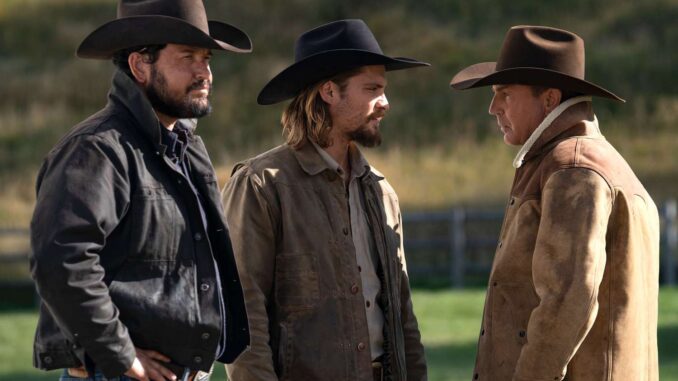
Yellowstone: Where Honor, Land, and Family Collide in a Fight for Survival
The earth itself seems to breathe in Yellowstone, exhaling plumes of superheated steam that vanish into the crisp mountain air, painting the sky with the ephemeral brushstrokes of the ancient and wild. Here, the ground beneath one’s feet is a thin skin stretched over a boiling heart, a constant reminder of the primal forces at play. But Yellowstone is more than a geological marvel; it is a crucible, a stage where the most profound human tenets – honor, land, and family – relentlessly collide, shaping a perpetual fight for survival, as raw and unyielding as the wilderness itself.
At the heart of every conflict in Yellowstone lies the land itself, not merely as acreage or a scenic vista, but as an extension of identity, a canvas upon which lives are etched. For the Indigenous peoples, the land is a sacred ancestral ground, imbued with the spirits of generations, a living testament to their history and culture. To them, stewardship is not a choice but a sacred duty, an honor passed down through bloodlines. Their survival is inextricably linked to the land’s health, its wildness, its bounty. Then there are the ranchers, their fences cutting stark lines across the vast plains, whose families have toiled on this soil for generations, their sweat and blood mingled with the dust. For them, the land represents inheritance, the fruits of hard labor, and the freedom to forge a life rooted in self-sufficiency. And for the vast machinery of government and conservation, the land is a national treasure, an ecosystem to be preserved, a monument to wilderness, a resource to be managed for all. Each perspective, valid and deeply felt, carves out a claim, inevitably leading to fissures and clashes on this very ground.
When these differing claims meet, it is often through the lens of honor. What one man considers honorable, another might deem a betrayal. For the Indigenous elder, honor demands protecting treaty rights, the traditional hunting grounds, and the integrity of sacred sites, even if it means standing against federal agencies or resource exploiters. To compromise is to dishonor ancestors and future generations. For the rancher, honor is tied to legacy – keeping the family ranch afloat, providing for his own, and defending his property from encroaching wolves or expanding public lands. His honor is in his word, his handshake, and his ability to endure against harsh elements and bureaucratic interference. Environmentalists, too, operate under a code of honor: to speak for the voiceless wilderness, to safeguard biodiversity, and to ensure that pristine landscapes are not sacrificed for short-term gain. These distinct codes, each born of deeply held values and a unique history with the land, are not easily reconciled. They are like tectonic plates, grinding against each other beneath the surface of Yellowstone, capable of erupting in sudden, violent conflict.
And tying all these threads together, making the stakes unbearably personal, is family. It is the unbreakable bond, the driving force behind the fight for survival that unfolds daily in Yellowstone’s shadow. For the tribal member, family encompasses not just immediate relatives but the entire community, the tribe, a continuity stretching back to time immemorial, whose cultural survival depends on their connection to the land. Losing that land means losing a piece of their soul, a severing of ancestral ties. For the rancher, the ranch is family. It represents generations of sacrifice, the inheritance passed from father to son, mother to daughter. The thought of selling out, of seeing the land developed or taken, is not just an economic loss but a profound moral failure, a betrayal of those who came before and those who are yet to come. The fight to protect the ranch, to keep the legacy alive, becomes a fight for the very identity of the family. The decisions made – to fight, to compromise, to yield – ripple through generations, shaping destinies and sometimes fracturing the very families they sought to protect.
The ultimate collision happens when these elemental forces – honor, land, and family – are pitted against the stark reality of survival. This isn’t just about economic viability or political power; it’s about the survival of a way of life, a cultural identity, sometimes even physical existence. When a rancher faces the threat of losing his land to debt or federal eminent domain, his honor demands he fight, his family’s future depends on it, and his very survival is at stake. When an Indigenous community battles for the protection of sacred sites from desecration, their ancestral honor, their connection to the land, and the spiritual survival of their people are on the line. The choices are rarely easy, often heartbreaking. Do you compromise your honor to save your family’s future? Do you sacrifice a piece of the land to secure a generation’s survival? These are the agonizing questions that Yellowstone, in its raw beauty and unforgiving nature, forces upon those who call it home.
Yellowstone, with its steaming fissures, roaring geysers, and ancient forests, is a living testament to this collision. It is a place where the earth’s heart beats wild and untamed, mirroring the fierce, unyielding spirit of its inhabitants. Here, honor is a compass, land is the prize, and family is the anchor, all locked in an eternal, desperate struggle for survival. The drama unfolds not just on the screen or in history books, but in the everyday choices, the quiet sacrifices, and the loud confrontations that echo across the vast, sacred landscape, reminding us of the fundamental human truths that are forged and tested in the crucible of the wild.
